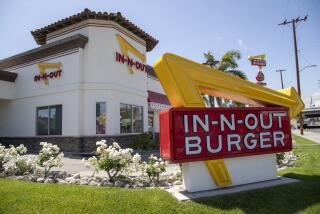How I Made It: Melissa Kieling, CEO of insulated bag maker PackIt
- Share via
The gig: Melissa Kieling, 38, is the co-founder and chief executive of PackIt, which makes foldable, freezable bags to keep food and beverages cold. Last year, PackIt was named one of the fastest-growing privately held companies by Inc. magazine. The company is headquartered in Westlake Village and has 24 employees.
The berry problem: When Kieling’s son refused to take blueberries in his lunch because they would be mushy and warm by lunchtime, Kieling thought there had to be a better cooling solution. Her rumination had to become a lifeline in 2009 after Kieling went through a divorce and needed income but had no career experience outside the home. Her house was in foreclosure, and her car had been repossessed. The stay-at-home mom researched gel cooling technology, tore down her shower curtain and pinned together a prototype of the first PackIt bag. Kieling begged her dry cleaner to stitch the pieces together because she couldn’t sew. “I felt so strongly that it had to work that I wasn’t willing to detract from that and go the safety route and get a safe, conservative, reasonable job,” she said. “I just tightened the belt everywhere and kept going.”
Building momentum: Kieling approached a friend, Jeannette Dirksen, and asked her to be her business partner. (Dirksen has since left the company but retains an ownership stake.) With $200,000 cobbled together from family and friends, the two hit the trade show circuit lugging an initial order of 5,000 bags. The product got some attention from buyers, but what stunned Kieling was the interest of their booth neighbors, who lined up after the show to buy the sample bags. “It was exciting to see people getting excited about it,” she said. “When you put something out there that you’ve poured your heart and soul into, you don’t know how the consumer is going to respond to it.”
Initial disappointment: Early on, PackIt grabbed the attention of Target Corp., and the company set up a meeting in 2010 to discuss the bags. The conversation did not go as hoped. Although Target officials said they liked the concept, they decided against buying the bags because they thought that customers would have trouble grasping what was special about them, Kieling recalled. “Our challenge has always been if you walk past our product on the shelf, it looks like every other lunch bag on the market,” she said. “The secret sauce really isn’t apparent to the consumer right off the bat in a glance when they see it on the shelf, so we had a lot of educating to do for our customers.”
Reaching customers: With a second round of financing from a group of private investors, the company produced a two-minute infomercial in 2011 that aired on children’s networks nationwide. “That was kind of this pivotal moment,” she said. “If it went well, it could make the company, and if it didn’t go well, it was definitely going to break the company.” Two years later, PackIt was in most major retailers, including Target.
Learning on the fly: Kieling never went to college and had no prior experience with marketing, business or product design. Though her early business cards read Founder/Mom, she said she now feels comfortable with her role as the company’s chief executive. “I feel like I have earned my seat at the table,” she said. “And it didn’t come in the form of an MBA from Harvard. It came truly in the form of trial and error.”
Family matters: Kieling lives in Westlake Village with her three children, ages 18, 16 and 11. Her kids have helped the company through its various stages, including fielding customer service calls during the infomercial days and contributing design ideas. “They’ve been part of the process the entire way from the minute I created it in my kitchen,” Kieling said. “I think we will all look back and have no regrets.”
Beyond lunch: PackIt has expanded beyond its initial lunch bag and wine bag to include 12 options including insulated sandwich bags and grocery bags, all manufactured in China. The brand is available in more than 40 countries, and the company has sold more than 5 million bags since it began. Last year, the company took in more than $15 million in revenue. Kieling said the company would expand its reach in the next year but couldn’t provide more details. “We definitely see that our technology applies to many industries above and beyond food and beverage,” she said. “I feel like we’re just getting started.”
Twitter: @smasunaga
More to Read
Inside the business of entertainment
The Wide Shot brings you news, analysis and insights on everything from streaming wars to production — and what it all means for the future.
You may occasionally receive promotional content from the Los Angeles Times.











